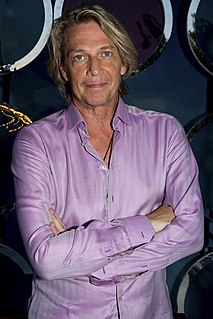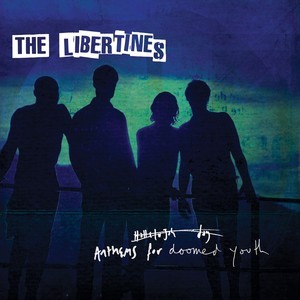"Gunga Din" is an 1890 poem by Rudyard Kipling, set in British India. The poem is much-remembered by its final line: "You're a better man than I am, Gunga Din",

UFO 2: Flying is the second album by UFO released in 1971 on the Beacon label; it was issued on CD in 1999 on Repertoire Records.

James Sclavunos is an American drummer, multi-instrumentalist musician, record producer and writer. He is best known as a drummer, having been a member of two seminal no wave groups in the late 1970s. He is also noted for stints in Sonic Youth and the Cramps, and has been a member of Nick Cave and the Bad Seeds since 1994. Sclavunos has led his own group the Vanity Set since 2000.

The Sadies are a Canadian rock and roll / country and western band from Toronto, Ontario. The band consists of Dallas Good, Travis Good, Sean Dean and Mike Belitsky. Dallas and Travis are the sons of Margaret and Bruce Good, and nephews of Brian and Larry Good, who are members of the Canadian country group The Good Brothers.

Shalom "Sam" Jaffe was an American actor, teacher, musician, and engineer. In 1951, he was nominated for the Academy Award for Best Supporting Actor for his performance in The Asphalt Jungle (1950) and appeared in other classic films such as Ben-Hur (1959) and The Day the Earth Stood Still (1951). He is also remembered for other outstanding performances such as the title role in Gunga Din (1939) and the High Lama in Lost Horizon (1937).

Ballad of Easy Rider is the eighth album by the American rock band the Byrds and was released in November 1969 on Columbia Records. The album was named after the song "Ballad of Easy Rider", which had been written by the Byrds' guitarist and singer, Roger McGuinn, as the theme song for the 1969 film, Easy Rider. The title was also chosen in an attempt to capitalize on the commercial success of the film, although the majority of the music on the album had no connection with it. Nonetheless, the association with Easy Rider heightened the Byrds' public profile and resulted in Ballad of Easy Rider becoming the band's highest charting album for two years in the U.S.

The Barrack-Room Ballads are a series of songs and poems by Rudyard Kipling, dealing with the late-Victorian British Army and mostly written in a vernacular dialect. The series contains some of Kipling's most well-known work, including the poems "Gunga Din", "Tommy", "Mandalay", and "Danny Deever", helping consolidate his early fame as a poet.

Erik Tommy Nilsson is a Swedish rock singer and composer.

Gunga Din is a 1939 RKO adventure film directed by George Stevens and starring Cary Grant, Victor McLaglen, and Douglas Fairbanks Jr., loosely based on the poem of the same name by Rudyard Kipling combined with elements of his short story collection Soldiers Three. The film is about three British sergeants and Gunga Din, their native bhisti, who fight the Thuggee, an Indian murder cult, in colonial British India.
Joseph H. August, A.S.C. was an American cinematographer and co-founder of the American Society of Cinematographers.

Dreamcatcher is a studio album by Ian Gillan, released in September 1997 in Japan, October 1997 in the United Kingdom and in May 1998 in the US. All songs were performed by Ian Gillan accompanied by Steve Morris. The album was being worked on between 1995 and 1997.

No Heaven for Gunga Din; consisting of The British and American Officer's Book, is a fable by Ali Mirdrekvandi, edited by John Hemming, who also wrote the introduction. Published in 1965 by Victor Gollancz Ltd (London) and E. P. Dutton & Company, and in six other languages.

Christopher Pravdica is an American musician and songwriter. He is best known as the current bass guitarist of American experimental rock band Swans.
“Done Too Soon” is a song written, composed, and performed by Neil Diamond, and released on his 1970 album Tap Root Manuscript. Listed as Track 4 on Side One of the album, it was jointly arranged by Marty Paich and Lee Holdridge and jointly produced by Diamond and Tom Catalano.

Anthems for Doomed Youth is the third studio album by English garage rock band The Libertines, released on 11 September 2015. The album contains two notable literary references, the tracks "Anthem for Doomed Youth" and "Gunga Din" referencing poems of the same titles by Wilfred Owen and Rudyard Kipling respectively. "Gunga Din" was released as the album's first single on 2 July 2015. The album's second single, "Glasgow Coma Scale Blues", was released on 20 August 2015.

Art Mix, was an American character actor from the 1920s until the mid-1940s. Prior to becoming an actor, Mix worked as a circus performer and a boxer. He initially appeared under his real name, Kesterson, before being given his stage name of Mix by Victor Adamson. During his career he appeared in over 200 film shorts and feature films. Although most of his roles were in smaller and bit parts, he would sometimes be cast in a featured role, such as in 1932's Border Devils, starring Harry Carey. Rarely, he was even given the lead role, as in the 1935 "B"-western, The Rawhide Terror.
The Gunga Din was an American rock band, formed in 1998 in New York City. Featuring vocalist Siobhan Duffy, guitarist/vocalist Bill Bronson, bassist Chris Pravdica, drummer Jim Sclavunos, and keyboardist Maria Zastrow, the band released two albums, Introducing: The Gunga Gin and Glitterati, in 1999 and 2000, respectively. Its members came from a diverse musical background, playing in the bands such as God Is My Co-Pilot, Swans, and Nick Cave and the Bad Seeds.
"Boots" is a poem by English author and poet Rudyard Kipling (1865–1936). It was first published in 1903, in his collection The Five Nations.
Gerard Francis Cobb was Junior Bursar of Trinity College, Cambridge. He was active as an Anglican layman, organist and amateur composer.

Gunga Din is the nickname of a particular standard motorcycle built by the Vincent HRD company at their factory in Stevenage, Hertfordshire, England. The bike was first assembled in 1947 as a Series B Rapide. It came to fill two roles; one of only two factory-backed racing bikes and a development platform for Vincent's high-performance V-twin models. Gunga Din underwent extensive modification throughout its working life until it was abandoned at the factory in the mid-1950s. Rediscovered in 1960, the bike was not restored until 2009.













